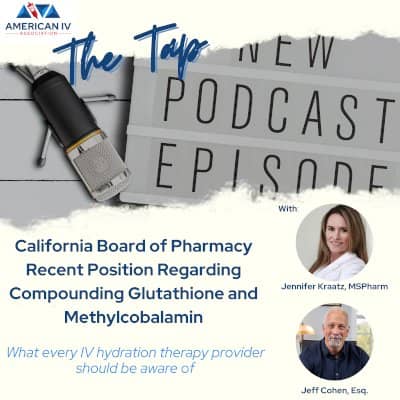Recently the CA Board of Pharmacy’s (BOP) filed a complaint against La Vita Compounding Pharmacy for compounding sterile preparations with Glutathione and Methylcobalamin. This complaint and what is happening with California Compounding Regulations should be taken seriously as they may have nationwide implications that every IV hydration therapy provider should be aware of.
Join Jennifer Kraatz, MSPharm, Founder of Pharmacy Upward and Jeff Cohen, Esq, Founder the Florida Healthcare Law Firm as they discuss what California providers are doing to circumvent this issue, what the possible consequences of their actions are, and what IV hydration therapy providers nationwide should be aware of, and be diligent in, to help avoid the same stipulation in their state.
A few topics that are covered during this podcast:
- Do state regulators really have the authority to make these decisions and do they investigate and uphold these decisions?
- What motivates regulators to investigate and pass such restrictions?
- If you are in California and your pharmacy has not received a cease and desist for Glutathione and Methylcobalamin injections, should you continue to order these products for your patients? Who is liable should you and/or the pharmacy be investigated? What are the ramifications?
- What is the difference between nutraceutical grade and injectable grade Glutathione and Methylcobalamin? How do you know if the pharmacy is providing you nutraceutical or injectable grade and why this is a critical issue?
- What should consumers be aware of?
- What have we learned from this, about the industry? Are other states likely to follow California?
- How can providers stay on top of the ever changing BOP and FDA guidelines? How do they shorten the gap between themselves and regulators?
Key takeaways:
- Partner with your pharmacy and ask them questions about quality, injectable grade, certificate of analysis, and more.
- View the regulatory bodies as your partners, communicate, and help close the gap.
- Every state is being regulated differently.
- Be more initiative-taking, self-regulate and define in a granular way what quality means to you and your organization. Quality is either going to be defined for you, by you or at you.
- Larger provider practices should become interactive and speak with the regulators, build a collaborative relationship, and become a quality resource to them on industry information.
- As consumers, you are paying for what you get.
Helpful links:
- State of California, Compounding Regulations Information
- FDA Human Drug Compounding Information
- Joint Commission: Pharmacy Rules/Regulations by State for Compliance with USP 797
- California Board of Pharmacy Contacts
- FDA Inspections of Compounding Outsourcing Facilities YouTube Video
- FDA on Human Drug Compounding
